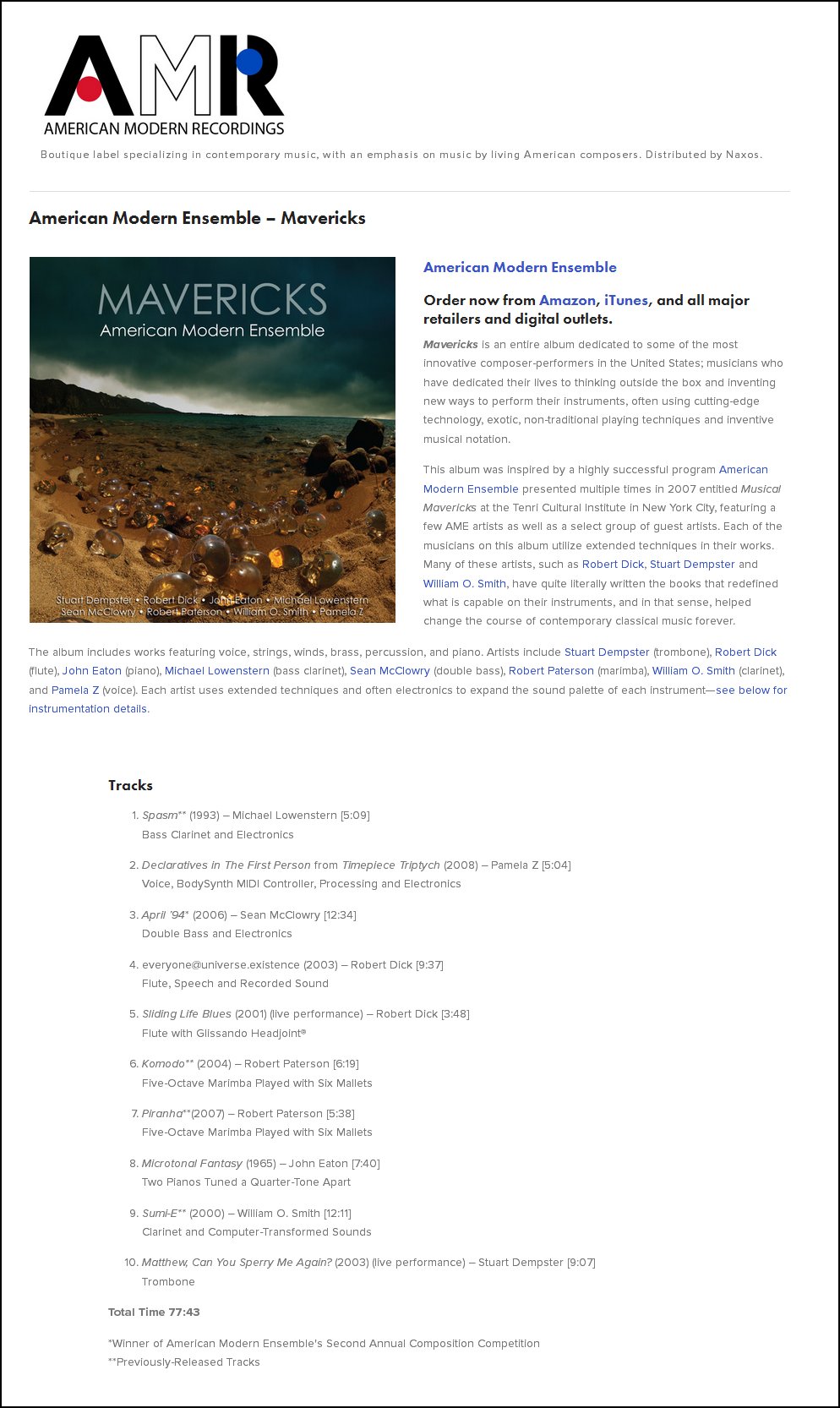Composer John Eaton
A Conversation with Bruce Duffie
In July of 1990, composer John Eaton was back in Chicago, and we arranged
to have a conversation. As usual on these pages, names which are links
refer to my Interviews elsewhere on my website.
While setting up to record our discussion, we chatted about several things
including his recordings, which is where we pick up the thread . . . . .
. . . .
John Eaton: I don’t
have any copies of any of my records, I’m ashamed to say. I really
don’t, except for some of my early jazz records, which they gave me a good
number of.
Bruce Duffie: On those,
are you playing other jazz, or your own jazz compositions?
JE: Some are my jazz
compositions, but I was never a third stream composer. My work in jazz
was always why I believed in it for what it was. I think of it as a
vernacular language, and that the aims of it, the goals of it, are very,
very different from those of written music or composed music. It’s
what Virgil Thomson used
to talk about as being the difference between a formal and a vernacular music.
In a vernacular music, the goal is to capture a moment of experience, whereas
in writing you’re somehow always involved with defining values, defining
some basic questions about the nature of music.
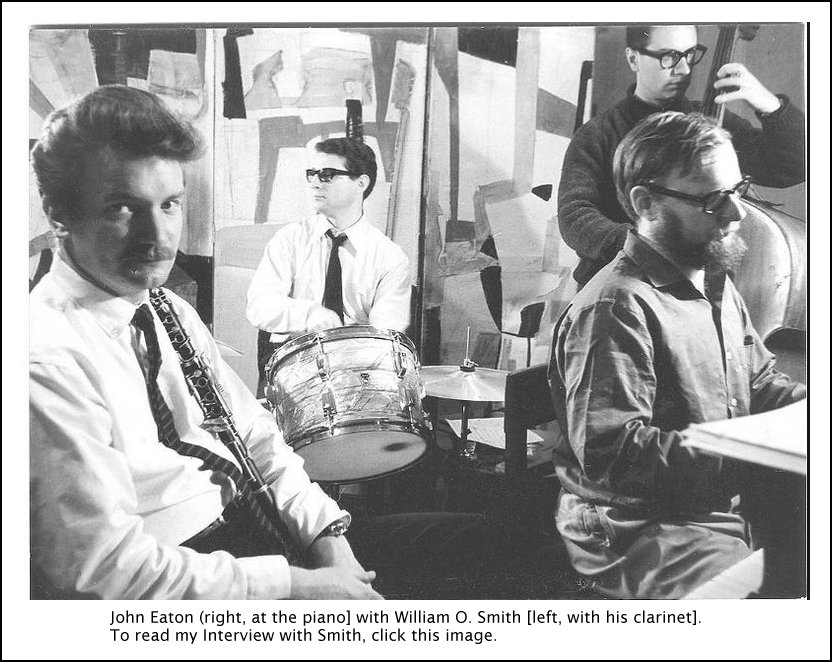
BD: Are you always redefining
the nature, or are you expanding on the definition that you have arrived
at?
JE: Probably both!
With me, every time I start a piece it’s a new adventure. It takes
me a long while to get started on a piece, and then I always write very,
very quickly once the image, the ideal of what I am trying to do gets in
my mind.
BD: So it has to settle
in your mind first?
JE: It has to.
I have to really decide what I want the piece to be. In writing an opera,
this means you have the dramatic form and overall musical form in your mind,
then getting the libretto...
BD: [Surprised]
You have the music first, and then put the libretto to it???
JE: Certainly.
Every opera I’ve written I’ve begun with a number of musical ideas that somehow
coexist with drama. Then I’ll certainly find the subject that I want
to set. When chills come up and down my spine, I know I’ve found it.
Then it’s a question of getting a librettist to work on it, and getting the
libretto to be done to your satisfaction.
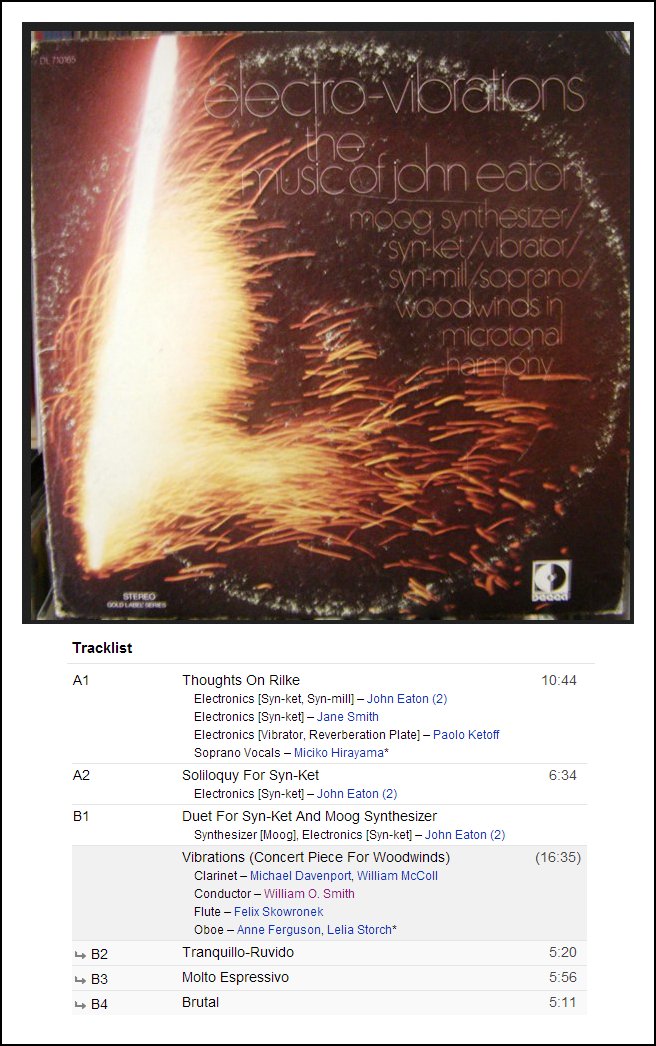 BD: Do you ever work on the libretto yourself?
BD: Do you ever work on the libretto yourself?
JE: I did once a long
time ago. When I was a student at Princeton, I wrote the first libretto
for an opera of mine called Herakles.
The person who eventually did the libretto for that opera is a poet, but
probably better known as an art critic, Michael Fried. [Michael Martin Fried (born April 12, 1939 in
New York City) is a modernist art critic and art historian. He studied at
Princeton University and Harvard University, and was a Rhodes Scholar at
Merton College, Oxford. He is the J.R. Herbert Boone Professor of Humanities
and Art History at Johns Hopkins University in Baltimore.] He
always keeps threatening to publish my first attempt at a libretto.
No, I just cannot create with words at all. Writing a libretto is a
very special gift. It’s almost harder to find a good librettist than
it is to find a good composer. It requires really knowing the effect
of words from the stage, and very few people have it. The only thing
I’ve been able to find is that people who are good translators are very often
very good librettists. Auden is a case in point, as is Andrew Porter. He
did the libretto for my opera, The Tempest.
For years, most of my librettos were written by an Irish poet who lives in
Italy by the name of Patrick Creagh (1930-2012), who makes his living as
a translator. A librettist must somehow have that ability to work freely
with language and have a real poetic craft, and also, to a certain extent,
be subservient to someone else’s vision.
BD: You say you have
a few ideas musical that come to you even before any words are put down.
Does that in any way hinder the freedom of the words in their creation?
JE: Probably not any
more than it would with any librettist at any time. The Ring notwithstanding — when
can argue back and forth because some people are convinced that Wagner is
a composer first and foremost, and the libretto is only a shorthand for his
musical vision — librettists have always had to conform
their ideas to the musical forms, or musical forming of a dramatic idea,
and it’s always the composer who’s the dramatist. If Aïda had failed, people wouldn’t
have blamed Ghislanzoni (the librettist), they would have blamed Verdi, of
course!
BD: But as I understand
it, at least the draft form of the libretto is usually handed to the composer
before the music begins to flow. I’m not a historian, so I can’t really
say what’s happened throughout history. Those who were practicing librettists
in the seventeenth and eighteenth centuries had a series of musical forms
that they worked with. They were well known to the composers, and the
composers would very often say they wanted this or that. Or if they
didn’t get this or that, they wouldn’t touch the libretto. But more
often than not it was the composer who made the initiative in terms of drama.
The libretto, to be sure, is usually done first, but what I found in my case
is that I’ll hammer it out with the librettist, and if there’s an important
dramatic decision to be made, I always reserve the right to say that it is
my decision.
BD: Do you make the
decisions in tandem, or completely alone?
JE: If you like somebody
that you’re doing the libretto with, it’s much more exciting to work in tandem,
and to talk about ideas and generate excitement about dramatic ideas, and
so on. But in terms of the particular form those ideas will take musically,
that’s really the composer’s job, and the librettist really must somehow
perceive the dramatic vision of the composer... and generally has.
BD: Now you’ve been
obviously producing successful operas, so is it safe to say that you believe
still in the opera as a form?
JE: Oh, absolutely!
I really do consider the core of whatever I do as a composer to be opera.
I write a lot of chamber music and music for orchestra, but I feel like my
creative activity all eventually flows if not into opera, at least big dramatic
pieces of one kind or another.
BD: So you will write
an orchestral score in a dramatic fashion so the drama comes through?
JE: Hopefully!
[Both laugh] It’s all a question of what the nature of music is, and
what you believe the nature of music to be. What to me seems so special
about music as an art and is unique about it is that by its nature it’s the
only art that begins with energy itself. It begins with a very core
of the way we perceive the universe, and the way we function in the universe.
It does have to do with the energy or with motion in the universe, and that
motion within man immediately touches emotion, and immediately touches drama.
Opera has always been a way of clarifying musical ideas. It’s a very
funny thing. Always the most adventurous composition has taken place
in opera — with possibly the exception of America for
the last fifty years or so. In America, there is this idea if you turn
to opera, you’ve got to suddenly become more conservative. That’s absolutely
silly because dramatic ideas are what clarify musical impulses, musical form,
and humanize it in a certain sense. Opera and other dramatic forms have
always been the way composers have tried out their new ideas, and then later
have turned to abstract music, working with the same ideas once they’ve been
given a certain meaning. This is a broad generalization and I’m sure
there are lots of exceptions, but nevertheless, it generally has been the
case, as I say, except for this very sad situation that we’ve had in America.
BD: Are trying specifically
to rectify this situation, or are you just coming to where we should have
been anyway as far as moving with opera?
JE: I write operas because
I love the subject. I love to write operas. I don’t really have
any particular program, though I certainly use the most adventurous ideas
that I’m capable of using in opera, more so than, for instance, if I were
to write a chamber piece. This may sound curious, but the fact is that
if a company makes its commitment to do an opera, you can pretty well be
sure they’re going to it right. Of course, in many cases the negative
side of the picture is that you may not get that commitment in the first place.
But the fact is that it’s almost safer to work with adventurous ideas in
opera than it is in chamber music, which may seem paradoxical.
BD: [Pursuing it just
a bit] But the chamber music groups usually have the time to rehearse,
and then they’ll play it a number of times, and really get good at it.
JE: But they normally
pick things that they can work up in a few rehearsals and take on tour.
Some of the least adventurous music in America now is that which has been
written for established chamber groups, for whatever reason.
BD: Really???
I was thinking of the Kronos, or the Arditti, or the Emerson
Quartets that will work on a piece for a long time, and then take it out.
JE: Some of them will
and some of them won’t. There are certain chamber ensembles that have
a real commitment to new music. There’s no question about it, but there
are also lots of chamber groups that simply will not do pieces that require
them to master new techniques, or require them to hear in a different way.
* *
* * *
BD: Are you a creator
of new sounds, or are you a finder of new sounds?
JE: That’s a really
interesting question. [Thinks a moment] I guess it depends upon
the way in which one would look at my work. I would tend to say that
we’re all finders in one sense, the way Michelangelo would talk about finding
the form of a sculpture in a block of marble. Musical materials generate
what we do with them. Being interested in musical materials which are
there, or are in the ear, many people have said that the word ‘form’
is not a noun, it’s a verb, and you find the form in the particular materials
that you work with. To take an example, you have the recording of my
opera Danton and Robespierre (1978).
I was working there with what certainly was a new idea for opera, and perhaps
a new idea, period. This was the blending of two different generating
principles of microtonality — the one which adjusts
the intonational system, which forms the music of Robespierre, and the other
music which is based upon division of the chromatic scale into quarter tones,
which essentially creates the music for Danton. As far as I know, this
is the first work — certainly of any dimension
— that does use, and pits against each other, two principles of
micro-tonality, or two generating principles of microtonality. So in
that sense you could say that I was creating new musical ideas, but I tend
to think I was just finding something in music that was very much in the
air. Certainly the whole idea of microtonality is a very natural and
very native one. There’s hardly a vernacular music or a folk music
in the world that doesn’t use microtonality materials in one way or another.
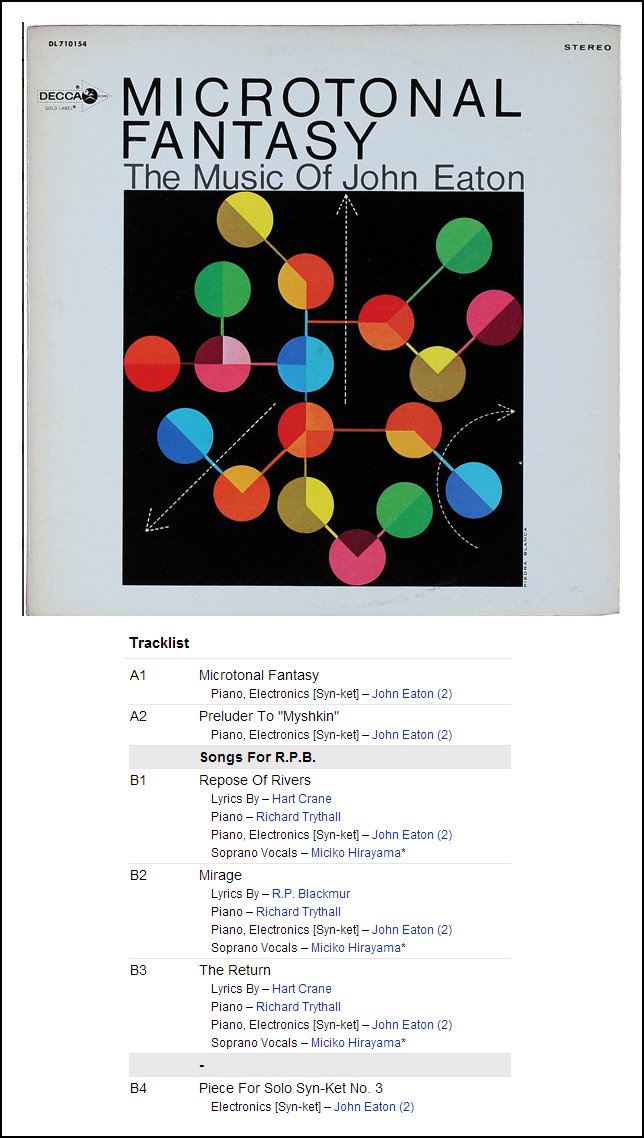 BD: And yet almost in the twenty-first century, we here
in America and Western Europe have gotten completely away from that.
BD: And yet almost in the twenty-first century, we here
in America and Western Europe have gotten completely away from that.
JE: Yes, except for
jazz, which uses ‘blue notes’
— bending of pitch — all the time. The most significant
composers today are all somehow expanding what Varese used to call the ‘prison
house of twelve bars’. They are all involved in one way or another,
in either driving to the very limit of the total chromatic, or on the other
hand, breaking that up for essentially a more consonant music
— music which is based on using overtones that were excluded by
simply using a chromatic scale.
BD: You’re working in
the area of concert music for concert audiences that tend to go to concerts
of non-microtonal music. How can you bridge that gap to get these people
to not only listen to the smaller intervals and the different kinds of patterns,
and yet appreciate it and understand it, and perhaps even enjoy it?
JE: I’ve never had any
trouble with that. Once audiences are exposed to microtonal materials,
they very often find them very intriguing and very natural, because, after
all, they are. The voice doesn’t fit into a chromatic scale, and, as
I say, no folk or vernacular music in the world does. Most composers
I know who become microtonal composers do so not to discover a new dissonance,
but to discover new kinds of consonants and a wider base for harmonic motion.
The biggest problem that we have in America is, purely and simply, our impresarios
— the people who run music. They are afraid of new ideas
and are afraid to take a chance. With a few exceptions, performers
tend to accept it. After all, they’re out there trying to make a living.
They don’t want to take chances. They have to have a check coming in
every month. I’ve been very lucky. For the last twenty years
I’ve been teaching at the largest music school in the United States, if not
the world, and I’ve had access to really gifted young performers who don’t
have the kind of prejudices that sometimes older and established performers
get. They enjoy adventure! They enjoy stretching their ears.
BD: So delving back
to Machaut is really no different than delving ahead into Eaton? [Guillaume de Machaut (c.1300-1377) composed
in a wide range of styles and forms. He is a part of the musical movement
known as the ars nova. Machaut helped
develop the motet and secular song forms (particularly the lai and the formes fixes: rondeau, virelai
and ballade). Machaut wrote the Messe
de Nostre Dame, the earliest known complete
setting of the Ordinary of the Mass attributable to a single composer.]
JE: [Laughs] I
don’t think anyone would listen to the two ‘musics’ and say they weren’t
different, but they’re both adventures. For that matter, once one does
that, then one can play Tchaikovsky and Rachmaninoff with a certain amount
of adventure and enthusiasm.
BD: Are there still
adventures to be found in Rachmaninoff and Tchaikovsky, and even Beethoven?
JE: Oh, absolutely!
If you take a symphony orchestra and have them do an all-contemporary music
program... which is perhaps not such a good idea, but if they do make a real
commitment to new music, then they can return to, say, the Eroica Symphony, and play it as if the
ink is still wet, and really get something out of it. If their ears
have had an adventure with new and exciting and challenging musical materials,
they can discover that Beethoven also had an adventure with new and exciting
and challenging materials. Of course that’s why his music lives.
BD: We’ve been dancing
around this a little bit, so let me ask the question straight out.
What is the purpose of music in society?
JE: Human beings need
to sing in the same sense that birds do, that whales do, that wolves do.
It’s part of our nature. We all have the need to sing. We all
have the need to experience. This is why we are talking about opera.
You often hear that opera’s a very artificial form, and yet to me it’s the
most natural art form. I have two children, and I watch them growing
up. They always say something like, “I’m the cowboy,
you’re the Indian! Dum, da, dum, da, dum, da, dum,”
and they accompany themselves with music. They tend to experience things
with music because music is so much a part of our existence as human beings,
and if it ever ceases to be, God save us!
BD: Would they have
done that if they hadn’t watched all the John Wayne pictures where he’s the
cowboy and they’re the Indians?
JE: I think so because
at the time that my children did it, they had never watched a John Wayne
picture. They had no television. It’s just the natural impulse
to play with song, or to act things out with song, or to have drama with
music. The unnatural thing in a way is separate them — to
put music in the concert hall, and put drama in the theater, and put painting
in the museum. The most natural thing is to bring all the arts together
in the synthesis which is opera, or which could be music-drama, or which
could be something that we haven’t even imagined yet.
BD: Then are you, as
the forward-thinking composer, also very much interested in the forward ideas
of stagecraft, and the forward ideas of make-up and lighting?
JE: Very much so, and
I involve myself with it as much as a particular budget will allow in any
opera production of mine that I have anything to say about whatsoever.
For instance, I always been passionately interested in opera for television.
I wrote an opera based on The Idiot
of Dostoevsky called Myshkin in
1970, where all the action takes place within the mind of Prince Myshkin.
He himself never appears, and it was quite successful. I never received
a penny for it, but it’s been seen by an estimated fifteen million people.
It won the Peabody Award, and the Ohio State Award, and it was shown all
over the world by USIA, and on closed-circuit television by various cultural
agencies and other governments. I really don’t know how many people
have seen it at this point, but the thing is that opera for television is
a very exciting idea.
BD: You are speaking
now of making an opera for the television, rather than taking a stage production
and trying to film it?
JE: Exactly, and in
making something, it used the full resources of television with the hopes
that eventually television sets will have the kind of sound that they could
and should have. That is the only serious drawback.
BD: But that’s coming
soon.
JE: I’m sure it’s coming
soon. Yes, it has to! Once people hear something sounding better,
they’re going to demand it.
BD: Do you find that
the home stereo system is adequate to your needs?
JE: Oh, absolutely.
BD: So the technology
is here, and all we have to do is connect it to the visual box.
JE: To the stereo, yes.
So there’s no reason why you couldn’t have the highest quality-level sound.
It’s just a question of putting good enough speakers and a good enough amplifier
into the television sets. I’m sure that will eventually come.
BD: And then you’ll
have a screen the size of your living room wall, and the images will be in
three dimensions! [Remember,
this interview took place in 1990, so everyone should acknowledge my Nostradamus-like
abilities...]
JE: Right! [Both
laugh] I really think there’s a great future for opera on television.
The one thing that always bothers me about opera for television is this business
of lip-synching. In Michigan we didn’t do it. We pre-recorded
the orchestra and directed the sound at the singers by directional speakers,
and they performed. By the very nature of what video tape is, television
is a performance, unlike the movies, which is more subject to cutting and
redoing and so on. There’s something about the very nature of video
tape that makes it a medium for live performance.
BD: A lot of that will
come now with the advent of the teeny-tiny microphone. Before, you
had to have the big microphones, and so they’d always be off-direction, or
off-mike.
JE: Of course.
I’ve used those tiny mikes at lot in stage productions of my operas.
For instance, in The Tempest, Ariel’s
voice is continually being picked up, and another voice is either
added by adapting a vocoder [(a portmanteau
of voice encoder), a category of voice codec that analyzes and synthesizes
the human voice signal for audio data compression, multiplexing, voice encryption,
voice transformation, etc.], or using a harmonizer [a type of pitch shifter that combines the ‘shifted’ pitch with the original pitch to create a two
or more note harmony].
BD: You could run each
mike through whatever kind of electronic synthesis you want.
JE: Right, exactly.
Then I also use digital echo. For instance, when Ariel sings ‘Hark,
hark, bow, wow,’ and she’s joined by a chorus, which is called the burden,
singing ‘bow, wow,’ the synthesizer did that. It’s just simply digital
echo, and that’s what I did in the film, rather than suddenly having a whole
chorus of spirits come on stage. I simply had Ariel sing it, but at
the point where she sang ‘bow, wow,’ she was picked up by digital echo, and
her voice was thrown all over the theater. It’s a much more effective
way, and a much more magical way of doing it.
BD: Sure, exactly, because
then it’s really in the mind!
JE: Yes, exactly.
BD: Are the possibilities
limitless?
JE: [Laughs] Well,
I don’t think anything is ever limitless, but they’re certainly inspiring.
The job of opera composers is to get involved with precisely this kind of
thing, and make it exciting, which is what opera is.
BD: Do you still want
to call it opera? You don’t want to call it by a new name?
JE: That doesn’t bother
me. The word ‘opera’ doesn’t bother me just as it doesn’t bother me
to call something that happens with air molecules moving ‘Thai
music’. It’s a generic enough name that it doesn’t
bother me. If somebody wants to call it something else, they’re welcome
to it, as long as they’re going to experience it and have an adventure with
it. That’s the important thing. I must say with great pride that
nearly every last performance of every production of an opera of mine since
about 1975 has been completely sold out, which means that the public is there,
and they are hungry for new experiences.
BD: Are these in small
theaters or large theaters?
JE: Both. San
Francisco Opera, for instance, and Santa Fe Opera. From what I understand,
the largest crowd in history is Santa Fe Opera was the last performance of
The Tempest. They not only
sold out all the seats, they sold out all the standing room, and they had
500 waiting to buy tickets. A lot of this was just simply that the people
were interested. They’d heard about what was done technologically with
that opera.
BD: But I trust you
don’t want to turn your operas into just pure spectacle, do you?
JE: Oh, absolutely not!
They’re not a ‘spectacle’ in any sense of the word.
* *
* * *
BD: How many operas
have you written so far?
JE: I think nine.
My first four operas I would soon forget about. My first opera was
written when I was nine years old, and my best friend was an undertaker’s
son, and he wrote the libretto. We had twenty or thirty characters
come into the undertaker’s parlor in the course of the first two acts, and
all die by horrendous and rather baroque means, such as poisoning, stabbings,
etc.
BD: Did the corpses
come to life and sing?
JE: [Laughing]
Well, no. Eventually, at the end of the second act, the undertaker
himself is forced to drink embalming fluid after having poisoned someone,
so at the end of the second act, everyone is dead. But in the third
act they all come back in their embalmed state and move realistically around
the stage. The opera was called The
Bitter End, and I’m happy to say that it was never performed.
BD: [With a gentle nudge]
Oh, you should bring it out now! It could be the hit in between the
next two Nightmare on Elm Street
films!
JE: Right! [Much
laughter] But there are a number of other things like that, and my
first real serious opera was called Herakles,
which was based on The Trachiniae
of Sophocles. It was done and broadcast while I was living in Italy,
and has been rebroadcast by RAI many times there. It was also was used
to dedicate the new Musical Arts Center in Indiana.
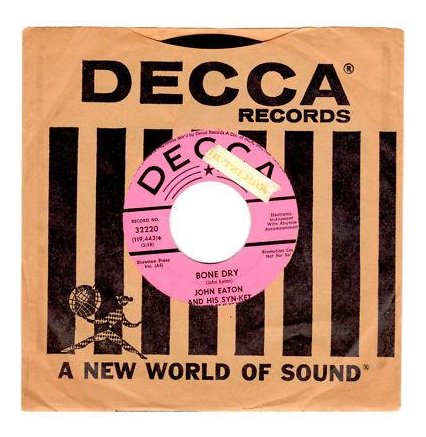 BD: How long a piece is it?
BD: How long a piece is it?
JE: Actually, the uncut
version is about five hours, and the cut version is about three.
BD: Should you impose
five hours of sitting on the audience, or is three hours sufficient for them
to get the drama and the music?
JE: At the time I composed
it I was twenty-three years old, and I miscalculated. It is too long.
The second act, in its uncut version, is two and a half hours, and that is
just too much.
BD: A hundred years
from now, after you’re dead and gone, people will be looking up these pieces,
and just as historians have brought back the uncut Don Carlos and the uncut Mozart, now
they will bring back the uncut Eaton. They will feel they should do
every note that you wrote, and make sure that they’ve cleaned out his waste
baskets, and put back everything that he tore out of the score!
JE: Well, that’s entirely
possible. It really is. I don’t know. Certainly it contains
a lot of very beautiful music and very telling drama, which was cut.
BD: Is this a microtonal
work?
JE: No. This was
the last non-microtonal piece or opera that I wrote. My next opera
was Myshkin, which I told you about.
BD: In writing that
for television, did you have time frame? Did you have to fit it into
an hour, as Menotti
did with Amahl?
JE: Right. The
total duration is fifty-three minutes. Then my next one was a children’s
opera, The Lion and Androcles, has
had a number of productions and performances. The incredible thing
about that is children have no difficulty with microtonality at all.
They don’t care. It’s just as natural to them to sing in quarter steps
as it is to sing in half steps, as long as it sounds right to them.
Then I wrote Danton and Robespierre,
and then The Cry of Clytemnestra,
which has had approximately twenty performances. That’s been the most
successful of my operas.
BD: Where does that
fit in, story-wise, with the Strauss and the Gluck works?
JE: It has nothing whatsoever
to do with the Strauss, which is a great disadvantage. It looks at
the Agamemnon from Clytemnestra’s
point of view. It sees the action of the Agamemnon, and actually ends right before
the Agamemnon begins, with the beacons
announcing Agamemnon’s return. Basically it’s an opera about this woman
who, in the Agamemnon of Aeschylus,
is one of the noblest heroines in all Greek drama. She has been given
a very bad shrift by subsequent cultural history. In fact, her daughter
was sacrificed for reasons of State, just as the way you could say we sacrificed
out innocence during the Vietnamese War. So it was an opera done very
much from that point of view.
BD: Is it meant to be
a political statement?
JE: It’s not a political
statement, no, except every opera, everything that you do has all sorts of
political overtones. It’s also been called the first feminist opera.
[Laughs] One can interpret it in that way, but that was not in my mind
when I wrote it. It was adopted with great enthusiasm by the feminist
movement. After The Cry of Clytemnestra
comes The Tempest, and then I’ve
just finished a big opera on a commission for the National Endowment for
the Arts on Jonestown, which is called The
Reverend Jim Jones. At this moment it awaits its first production,
but there are a number of people who are interested in it, and hopefully
it won’t be more than another year or so before it sees the light of day.
BD: Do you have ideas
for the next one after that?
JE: Not really no.
At the moment I’m writing a lot of chamber music. I just finished a
big dramatic cantata called The Divine
Narcissus, which is based on a play by a great Mexican poet of the
seventeenth century, Sor Juana Inés de la Cruz, and now I’m writing
a theater piece for a chamber group in New York, which is based on Peer Gynt.
In fact, I think my sense of humor will fail me before this actually happens,
but I’m thinking of calling it Suite Peer
Gynt! [Both laugh] I can’t imagine a greater mismatch
of talents than Grieg and Ibsen, both of whom I have incredible respect for
as creative artists, but they certainly were different. Grieg just
writes a series of mood pieces around this most dramatic and most telling,
forceful nineteenth century vision of Ibsen, and so what I’m going to try
and do in my piece is to seize the action of the play and have all the parts
of my ‘suite’ be representations of the essential action, rather than mood
pieces or pictures.
BD: His was incidental
music to the play.
JE: That’s quite right,
yes. Actually, I think I read somewhere that he objected very much
to it being made into a suite when he finally let it go by because he needed
to pay the rent.
BD: And now it turns
out to be a big hit with audiences.
JE: It’s wonderful
music. Grieg’s a wonderful composer.
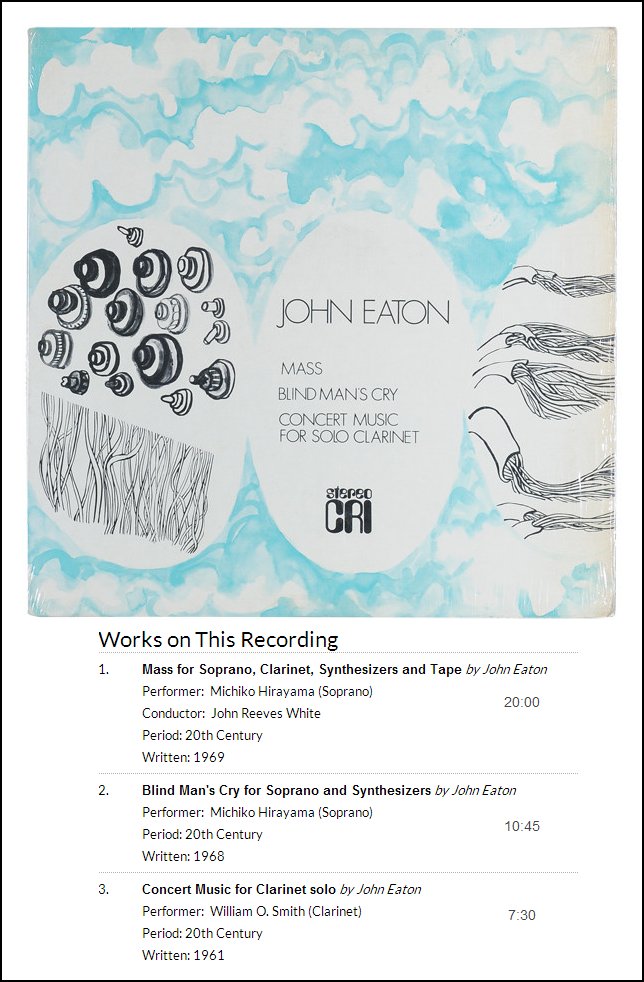 BD: Do you feel that sometimes composers are not the right
people to dictate how and where their music should be done?
BD: Do you feel that sometimes composers are not the right
people to dictate how and where their music should be done?
JE: As long as you’re
alive, you’ve got to try. Maybe we’re not, but the most important thing
for a composer is to be writing music and to be maintaining his own artistic
integrity and vision. If you let people kick you around and push you
around — or push your music around — you’re
not going to be doing too much writing with much integrity.
BD: Yet, but even a
giant like Beethoven has performances which differ wildly in playing time...
and then there is the use of old instruments and new instruments, and all
the pulling and pushing and stretching and compressing...
JE: Yes, but this has
all happened after his death. What happens after my death is up to
history. [Laughs] I have nothing to say about it. On the
other hand, I’m sure Beethoven would have had very strong opinions on how
his music ought to be done.
BD: While you’re alive,
do you want every performance of any of your pieces to be identical to the
previous ones, especially those you have either participated in or at least
supervised?
JE: Oh, absolutely not,
but I do want it to be true to what I envision. One of the great things
about music is that any piece has a number of latent meanings in it, and
any performance will make a series of those latent meanings more or less
potent. They can be very different depending upon the artist, depending
upon the hall, depending upon all kinds of things, and a composer works with
that. But there are certain things that are untrue to what you envision.
BD: So there is a line
in the sand at some place?
JE: There’s a certain
point where you feel that this may be destroying the essential vision of
the work, and then you have to step in.
* *
* * *
BD: Before we sat down
and turned on the tape recorder, we were talking about one recording of a
piece of yours that you didn’t particularly care for. Is there no redeeming
quality in that disc? Can that not introduce people to something even
though it may not be exactly what you envisioned?
JE: I don’t think so
because it’s so false. The sounds that people hear are not the sounds
I envisioned. The whole nature of the piece is utterly different from
what I had envisioned, and to me it makes absolutely no sense at all.
BD: Obviously to the
performer thought it was a coming to grips with what was on the page.
JE: In this particular
case, I wonder. For instance, even an essential matter like the tuning
is all wrong. That I don’t think is coming to grips with what I had
on the page. I don’t want to get any more specific than that.
The fact is that people do deserve a lot of credit for trying anything which
is new. On the other hand, if the composer is alive, performers also
have a responsibility to check what they’re doing, especially in the case
of something like a recording, because a recording is making a documentation
of a piece. If this particular piece was done in a concert performance
by the performer or performers involved, I wouldn’t have objected as much.
But somehow, when it’s out there on disc it documents what a piece is supposed
to be like, and the person who buys the record has no idea whether the composer
has approved that performance or not.
BD: So if I came to
that recording and I listened to it, and was impressed by what I heard and
found it as being something quite viable...
JE: Well, I’m glad in
a way! [Laughs] The only thing I could say is that I would like
to play you another performance of that piece so you could see what more that
piece is capable of being.
BD: Okay. That’s
all I really want to find out about that, and we won’t even identify it.
Setting aside that particular recording, are you basically pleased with the
other recordings that have been made of your music over the years?
JE: Most of them.
There’s one recording I consider very important of my electronic music, which
is a CRI recording called ‘The Music of John Eaton’ [shown above right]. It has the
Mass, which was a Koussevitzky commission,
and Blind Man’s Cry, which was the
most important of my early ensemble-electronic pieces, as well as the Concert Music for Solo Clarinet.
Now it says ‘This is a composer-supervised recording’, but it wasn’t!
I had nothing to say about the pressing of the recording. I was there
for the making of the tapes, but the only way I would encourage people to
listen to that recording is to boost the volume way up. In making the
disc, somebody tried to save space and slapped a limiter on it. The
same thing happened on the Turnabout recording of the Concert Piece for Syn-ket and Symphony Orchestra.
This is crowded into a tiny space. It’s a longer piece than the one
which precedes it, and yet it takes up thirty per cent of the side, and the
other (shorter) piece takes up sixty per cent of the side.
BD: So the grooves are
compressed?
JE: The grooves are
compressed, which means dynamic level of the end of the piece that precedes
it is about a piano, and it’s as
loud as the beginning of my piece, which begins forte. Therefore, people have no
conception of the richness of the sound that is in my particular piece.
BD: Barring that, if
you just played your piece on that record with no previous aural image of
anything else, then it’s okay, then it stands out?
JE: Then it would stand
by itself as long as person playing it would turn up the volume to extent
where they are listening to a forte
beginning.
BD: Is this an old record
or a new record?
JE: It’s an old record.
It was made in 1970 or ’72 or something like that.
My living for something like ten years was made as an electronic troubadour,
giving live performances of electronic music on sound synthesizers especially
built for that purpose. During the whole period between 1964 and 1970,
when this recording was made, I must have given close to a thousand concerts,
performing electronic music live.
BD: For what kind of
audiences?
JE: Oh, all kinds!
Anybody who would pay me, who would listen, essentially. For instance,
I did the Concert Piece for Syn-ket and
Symphony Orchestra at Tanglewood. I also did it with the Los
Angeles Philharmonic and with the Dallas Symphony. I really did a lot
of performing of it. I was living in Rome for much of this time, so
a lot of the concerts that I gave were new music festivals in Europe, such
as the Venice Festival. There were festivals all over Italy and Germany,
and so on. There’s a richness in the music that would appear in a concert
hall that simply was very difficult at that time to capture on a recording.
There were so much information that was being given out which was of an unconventional
sort that I’m rather unsatisfied with all the recordings that were done of
this particular part of my musical output. I just felt the technology
of that time didn’t capture everything that was in the live performances.
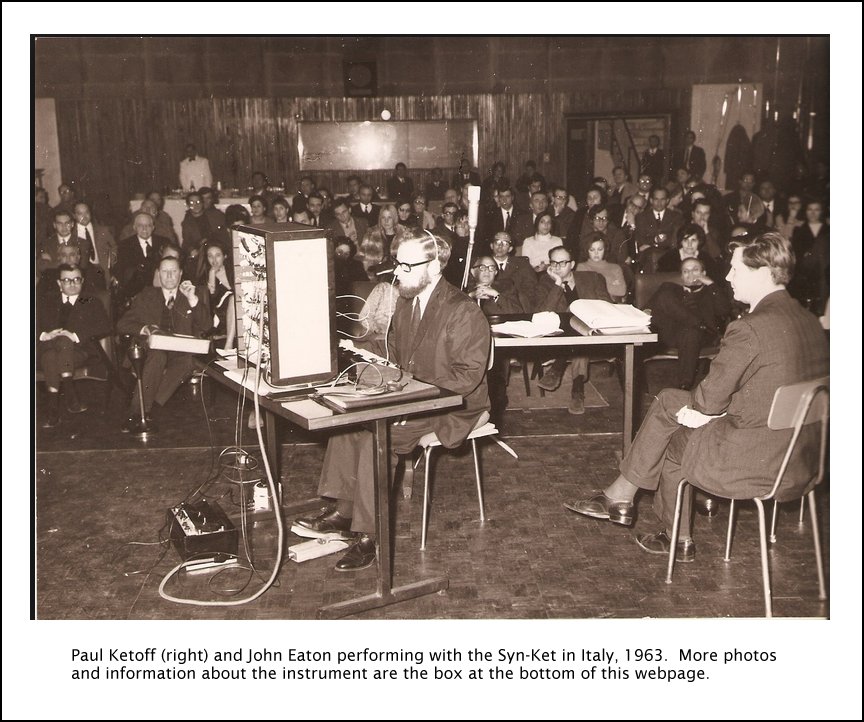
BD: Is it like looking
at one of the old black-and-white films from the ’20s?
JE: Yes, in a way it
is. But electronic music suffered more from that than conventional
music because I just hate the limiter. The limiter is something I would
to have just utterly destroyed. I also hated the way that people would
compress things just to get another piece on a record. I would have
rather the piece not been recorded than been given that kind of that picture.
Of course, people who understand that can correct it now.
BD: [Being optimistic]
Now that things are coming out on CD, perhaps some of the correction will
be made at the engineering department of the record companies.
JE: Yes, and I am sure
there are tapes which still exist. But Turnabout is out of business,
and I made two early recordings for American Decca, which went out of business
about four or five years after I made them. I’ve been told those were
the first live performances of electronic music on sound synthesizers.
BD: So you’re really
a pioneer?
JE: In that sense they
could have been thought of being important documents.
BD: Did you work at
all with Otto Luening
and Vladimir Ussachevsky?
JE: I knew Luening very,
very well, but his was not live performance on electronic synthesizers.
They were exclusively with magnetic tape, and with live instruments coupled
with magnetic tape. But I knew both of them very, very well, and Otto
still remains a very close friend. He’s one of the great unappreciated
figures of contemporary American music. He probably did more to help
American composers than anyone else. He was constantly going around
working for the benefit of other people. He’s just had his ninetieth
birthday, as you probably know.
BD: Right. I did
a special program of his music and my interview with him on WNIB. Do
you foresee a time when the synthesizer, as you know it, will be a standard
part of an orchestra?
JE: Oh, sure.
I’m not talking about concert music necessarily now, the kind of concert
you hear in symphony orchestra halls. Think about the music for television
and for radio. Think about the music that we hear most of our life.
It’s an incredible combination of synthesizers and mechanical instruments.
However, having said that, let me take one step forwards and two steps backwards,
and say that I’m really disappointed in the direction which synthesizers
are moving right now.
BD: [Surprised]
Why???
JE: For all their limitations
and faults, the old analogue synthesizers were responsive to very innovative
kinds of controls in the formation of sound by a human being. You could
carve out your own envelopes in a way you cannot on digital synthesizers.
Electronic music has vacillated its entire history between something I’d
like to call the ‘theorem’ conception —
a purely controlling of electronic materials which become musical
materials in real time on a very special instrument made for that
— and the ‘Hammond organ’
conception, where digital synthesizers have pre-programmed envelopes which
are very, very difficult to get into the sound, to work directly with the
sound, to take it like clay and shape it and mold it. The digital synthesizers
are, at least up to this point, very much part of the ‘Hammond
organ’ kind of idea.
BD: So, early on we
didn’t know what could be made of it, and now that we know some of the things
that can be made of it, that’s being pre-programmed for it?
JE: Yes. Of course,
they work with a much richer kind of sound material. The sound is far
more interesting to listen to than it was with some of the old analogue synthesizers,
with the single exception that you could feel a human being at work with
the things that were done with those synthesizers. Whereas with the
digital synthesizers, you feel like somebody’s pulled out an organ stop very
often, and, in fact, that’s what happens.
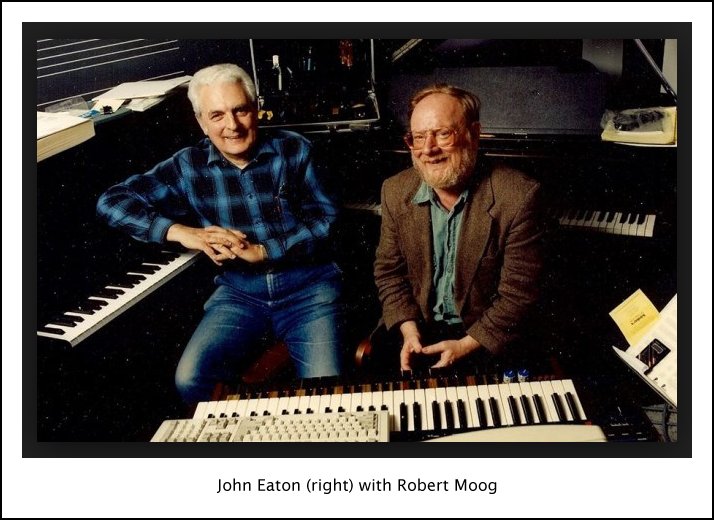 BD: So you don’t want to lose the humanity, even though
it is a completely synthesized idea?
BD: So you don’t want to lose the humanity, even though
it is a completely synthesized idea?
JE: No. To me,
that’s the whole essence of music — to feel a human
being shaping an envelope, shaping sounds. I’ve been working for seventeen
years on an instrument which has just been finished by Robert Moog (1934-2005),
so who knows? I may become an electronic troubadour again. It’s
an instrument in which every key on 355-note keyboard has a Minikin chip in
it, and will respond to precise degree of finger touch, or the vertical or
horizontal position on the key, the amount of space your finger covers on
the key, and the hand pressure once the key is depressed. So any key
at any particular time is capable of giving out four controlled voltages which
can be applied to anything whatsoever. With this we may be able to
return to what was good about the analogue synthesizers, where you could
shape the materials directly.
BD: Are we returning
to something that was good, or are we taking the next step?
JE: Well, taking the
next step. I don’t mean returning, no. I mean this can be adapted
through programming in a way that we can get inside of what happens with
the digital synthesizer. Right now it’s very, very difficult because
very few things about a digital synthesizer are open and can be controlled
in real time. You take what you get, essentially. You can program
it at the beginning, but once you’ve got something, you’re stuck with it.
BD: But you’re a creator.
Are these machines that you don’t care for so much made for re-creators or
interpreters, rather than creators such as yourself?
JE: No, because the
way music begins is with a complete engagement of a musician’s sensibility
with a range of musical materials. Whether that engagement is as a
performer or as a composer, you absorb, and then it becomes largely an unconscious
or an intuitive process, both the composition of music
and the performance of music. Unless you can get that kind of real-time
control and engagement of the sensibility of the performers, and through
performances of composers, it’s very, very difficult for music to come into
being. Music has never been anything except something theoretical that’s
dreamed up. Music has always involved a very active social mechanism.
The basic and most refined instrument is the human voice, and it is still
the most flexible and interesting instrument of all. All instruments
aspire to the condition of the human voice. The thing which fascinates
me about this new synthesizer is the way it combines the techniques of playing
a stringed instrument — that is the vertical and horizontal
space occupied on a key — with the technique of playing
a keyboard instrument. You can bring them together, and thereby for
the first time control the tremendous complexities of electronic music.
So far, no one would deny that the great problem with electronic music has
been its lack of susceptibility in the human nuance, as well as its lack
of real engagement of the sensitivities and sensibilities of performers and
composers. We’ve had a whole range of new materials which keep coming
at us constantly. What we have is very, very little music in which
one feels a human being working with those materials in the same way that
you would be essential to all music... like a shepherd sitting out a hillside
playing a flute over and over again until he masters everything it can do
and there’s almost a completed deification between him and this reed pipe.
Now imagine if we could do that in some way with electronic music, with all
its richness and potential. That’s what needs to be done.
BD: Just as we now have
the virtuoso violinist and the virtuoso keyboardist, are we going to have
the virtuoso synthesist?
JE: Oh, I think so.
In a way we have a lot of them already. At a certain period of my life
I was a virtuoso synthesist. I made my living that way, and certainly
that will come again.
BD: Do you ever see
there being a competition for synthesists like in the ones we now have for
pianists?
JE: I wouldn’t be surprised.
It’ll be a while, but first of all we have to have the synthesizers.
There’s still a lot of stuff that needs to be overcome about that.
* *
* * *
BD: Are you optimistic
about the future of music?
JE: [Thinks a moment]
Yes, I guess I am! There’s always a necessity for music. There’s
a lot that goes on that makes you be very pessimistic about the situation
of music right now, but probably things are better than they were when I
was younger.
BD: How so?
JE: There are many more
opportunities for composers. I grew up in the 1940s and ’50s,
and you heard very little of the really new music that was being written.
Composers just had no possibility in the United States of making a living
from composing. Now there are many composers who are doing that through
commissions, through various kinds of programming, and so on.
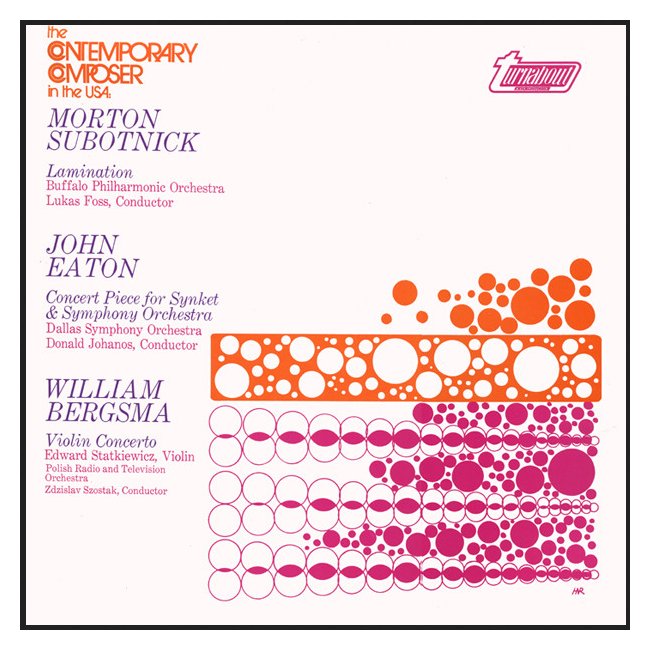 BD: Is there any chance there are too many young composers
coming along?
BD: Is there any chance there are too many young composers
coming along?
JE: I don’t know.
[Laughs] There’s certainly are a lot of bad ones, but there have always
been those.
BD: How do we sort through
it all so that the bad ones go into something else, and the good ones remain
working with their creations?
JE: Listening is the
only thing that’ll do it. Things have a way of taking care of themselves.
It’s still not a field where someone can enter and make a lot of money in
a hurry. That just sorts a lot of it out. One really does have
to make a commitment to music to get into it in the first place.
BD: You can’t dabble
in it! [Vis-à-vis the record
shown at right, see my Interviews with Lukas Foss and William Bergsma.]
JE: No. It’s not
like painting. Anybody can go out and buy canvas and an easel and some
paint, and start and keep shop. On the other hand, with all the computer
programs that are coming up for the creation of music, we may soon have that
kind of situation where there will be a lot of home sleaze being foisted
on the public.
BD: Now with machines
that will take what you play and record it, and then you can alter it and
change it around, and keep it, will that be good to re-invigorate the musical
amateur?
JE: The more people
are composing, the more people will appreciate really good composition.
The year I was at the University of Chicago, I was asked to teach a course
called ‘the appreciation of music, materials and design’ for a group of people
who were not musicians, who didn’t know how to read music. In fact,
that was the stipulation for entering the course.
BD: Music for non-majors?
JE: Right, music for
complete non-musical-literate. If somebody played an instrument, I
threw them out! The way in which I taught musical appreciation was
quite stimulating, and got them to create music and to compose. I found
myself really listening as much as they, and getting excited about what they
heard by the end of the quarter. I wish I’d had about a year to do
it. There is just not time enough. But on the other hand, they
all ended by writing a piece in more than one voice. So having tried
it themselves, they can appreciate how good Mozart is or how good Beethoven
is, much better than they can by being told the recipe for a Mozart symphony.
BD: Can they then appreciate
how good Eaton is?
JE: [Laughs] Hopefully.
I must say that that didn’t cross my mind.
BD: Do you feel you’re
part of a lineage of composers?
JE: Yes, certainly.
On the other hand, though, I’ve always been somewhat of a maverick in that
I’ve never joined any particular movement. I’ve never let my music represent
a particular line. I was in Europe, living in Italy through the ’60s,
and I used to hate the way the young composers would all come back from Darmstadt
with their recipe for the year, their fashion for the year. In any
case, in the United States music is not as politicized or socialized as it
is in Europe. We don’t seem to have that need, maybe because the country
is so vast.
BD: Even with the Uptown/Downtown
or East Coast/West Coast factions?
JE: In any one of those
areas you don’t have really have much organization in the sense of people
saying this is the way it has to be done, which does happen in Europe.
There’s always the idea in Europe of somehow creating the spirit of the age.
Yeats said that every worthwhile poet is either a hundred years ahead or
a hundred years behind their time. But nobody ever expresses of spirit
of their age, and one blessing to having been an American composer is that
we do avoid that kind of thing a lot.
BD: In general terms,
what advice do you have for composers coming along?
JE: Write the kind of
music you love and want to hear on a concert. Be true to your own taste,
and gradually keep trying to expand it. It’s always a great problem
when composers are not genuine. In teaching composition, I usually
spend about two or three years getting composers simply to be honest with
themselves in saying, “I like this. This is something
I really believe in. This is something I’m really enthusiastic about,”
and until you get them to that point, you can’t do anything.
BD: But once you get
them to that point, then you can work with them and help them?
JE: Then they work with
themselves! Composition is largely a voyage in self-discovery.
One of the most interesting composers in Europe, who died recently, was a
Count in Rome named Giacinto Scelsi (1905-1988). He would get up every
morning at 4 o’clock, meditate for two or three hours, and then he would
improvise on a little instrument that he had built especially for himself.
At the end of that period, which would be about 2 PM, if he got something
that he really liked, he’d keep it and have it notated. I would not
go that far, but I do think there is a way in which all worthwhile composition
is basically a religious act. It’s basically an act of meditation.
It’s an act of discovering a vision. It always burns me up when people
from the outside say, “You’re simply indulging yourself
if you say you write for yourself.” The reason
why this is so wrong is that before a composer can do anything, he must lose
himself and be captured by the beauty of whatever music he’s trying to create.
It’s almost like the old saying ‘He who would find his life must lose it’.
That certainly happens in composition. I don’t mean to say that all
composers should immediately go and join a church, or something of that kind.
That’s not what I have in mind at all.
BD: It’s a personal
and spiritual revelation?
JE: Yes, exactly.
It’s a quest. It’s a continuous search, and it’s something to which
any worthwhile composer has dedicated his entire life.
BD: Is it fun?
JE: There’s a lot of
toil, there’s a lot of hard work, there’s a lot of sweat, there’s a lot of
genuine tears. I wouldn’t call it fun. I’d call it joyous.
There certainly are rewards when you do capture a vision, when you hear the
occasional really good performance that does likewise. Everything else
just pales into insignificance. Everything else you experience in your
life seems so small in comparison.
BD: You just turned
55 years old. Are you at the place where you thought you’d be, or where
you think you should be?
JE: I never really thought
like that. I was always so excited about what I was doing
— and I still am — that I just don’t think
in those terms.
BD: That’s good.
You’ll be a little kid forever!
JE: Probably!
[Has a huge laugh] The only time I think about that is when I think
about some of the responsibilities I’ve taken on — like
children and my family. But I never had any program of being such-and-such
as a composer at such-and-such an age, or anything of that kind because it
doesn’t seem to me that’s the point.
BD: So you’re happy
with where you are now?
JE: Essentially, yes.
Naturally, everybody has things they would like to change, or would like
to have different in a way...
BD: I wish
you lots of continued success. Thank you for the conversation.
JE: You’re more than
welcome. I really appreciate your interest.
© 1990 Bruce Duffie
This conversation was recorded in Chicago on July 9, 1990.
Portions were broadcast on WNIB in 1995 and 2000. This transcription
was made in 2017, and posted on this website at that time. My
thanks to British soprano Una Barry for her help in preparing this website
presentation.
To see a full list (with links) of interviews which have been transcribed
and posted on this website, click here.
Award -
winning broadcaster Bruce Duffie was with WNIB, Classical 97
in Chicago from 1975 until its final moment as a classical station in February
of 2001. His interviews have also appeared in various magazines and
journals since 1980, and he now continues his broadcast series on WNUR-FM,
as well as on Contemporary Classical Internet Radio.
You are invited to visit his website
for more information about his work, including selected transcripts of other
interviews, plus a full list of his guests. He would also like to call
your attention to the photos and information about his grandfather,
who was a pioneer in the automotive field more than a century ago.
You may also send him E-Mail with
comments, questions and suggestions.
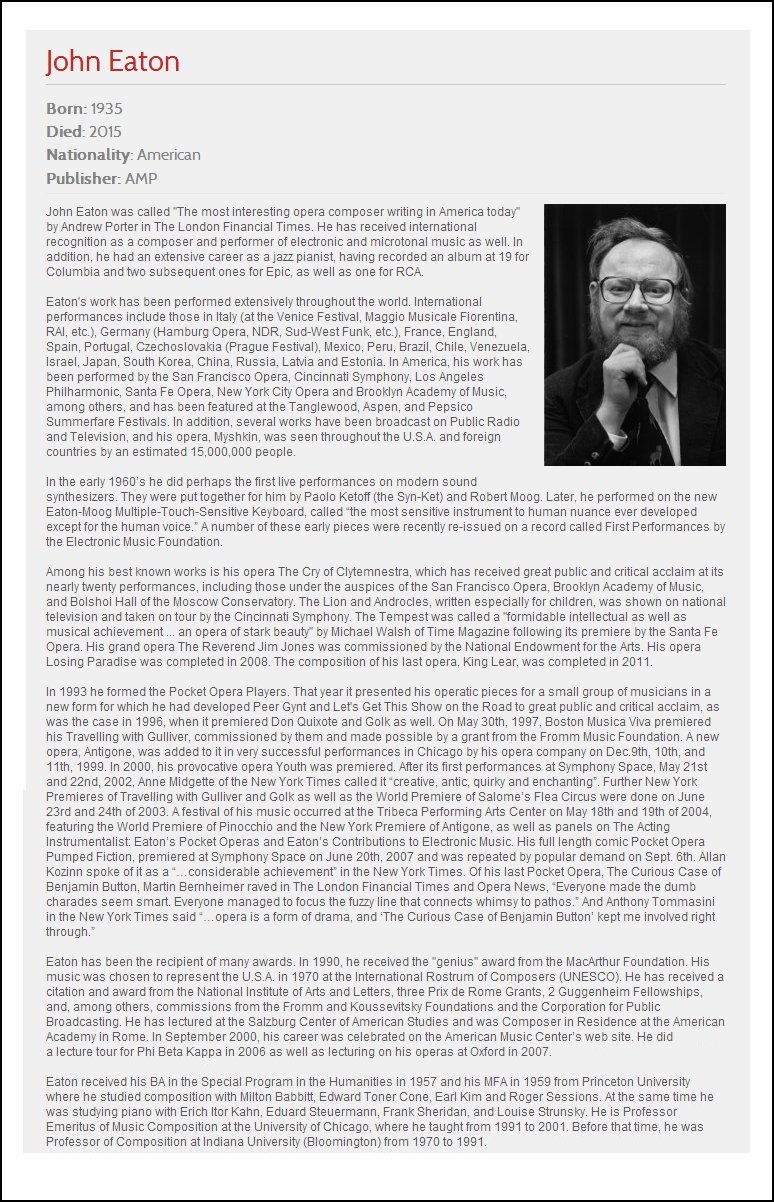
 BD: Do you ever work on the libretto yourself?
BD: Do you ever work on the libretto yourself? BD: And yet almost in the twenty-first century, we here
in America and Western Europe have gotten completely away from that.
BD: And yet almost in the twenty-first century, we here
in America and Western Europe have gotten completely away from that. BD: How long a piece is it?
BD: How long a piece is it? BD: Do you feel that sometimes composers are not the right
people to dictate how and where their music should be done?
BD: Do you feel that sometimes composers are not the right
people to dictate how and where their music should be done?
 BD: So you don’t want to lose the humanity, even though
it is a completely synthesized idea?
BD: So you don’t want to lose the humanity, even though
it is a completely synthesized idea? BD: Is there any chance there are too many young composers
coming along?
BD: Is there any chance there are too many young composers
coming along?